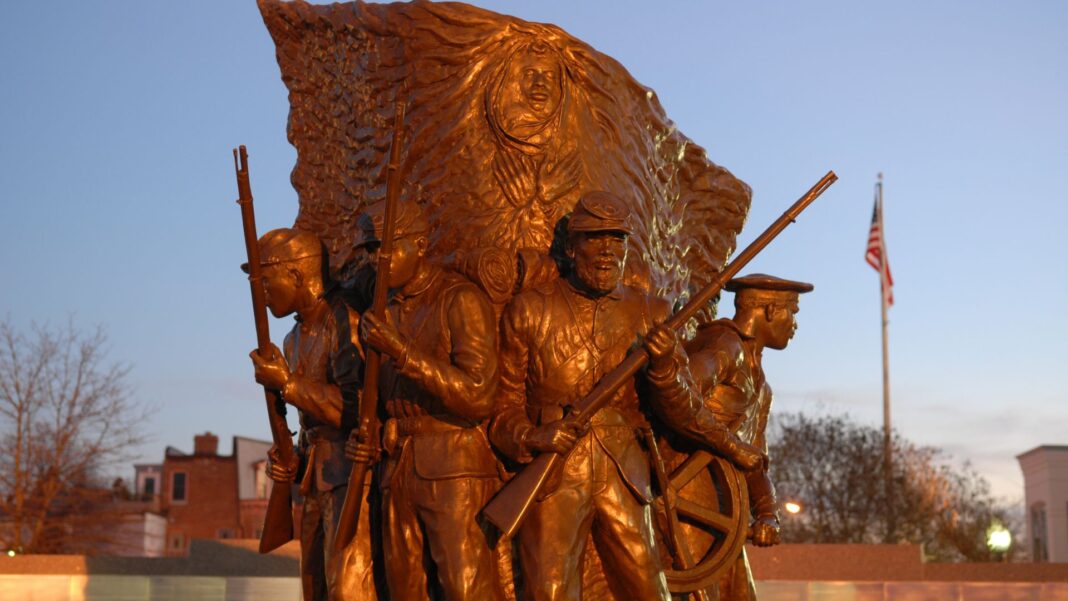Reading the Names: Honoring Black Veterans at the African American Civil War Memorial
On a blustery November morning, the atmosphere around Washington, D.C.’s U Street – African American Civil War Memorial – Cardozo Metro stop was electric. Dozens of voices, united in purpose, chanted names into microphones as they honored the legacy of Black soldiers who contributed significantly to the nation’s history. For over an hour, the sound of names reverberated through the crisp air, creating a poignant moment for those gathered: Black veterans and their descendants, all witnessing this collective tribute to the United States Colored Troops.
This moving event, the Reading of the Names, marked a profound acknowledgment of over 200,000 individuals who served in the Civil War. It was especially significant as it aimed to celebrate the anticipated reopening of the African American Civil War Museum (AACWM), a landmark that has faced numerous delays due to funding issues and the prolonged government shutdown. Although the museum’s unveiling was postponed, the memorial and its tribute to the legacy of Black troops remained accessible to the public.
A Full-Circle Moment
Among those present was Jhermaine Drakeford, who shared his personal connection to the memorial. Having moved to D.C. in 1992, he was unaware until that day that he had ancestors, Wilson (Wilkinson) Diggs and David Dobbins, honored in the ceremony. “It was a full-circle moment that we’ve achieved so much. We owe a debt of gratitude to them,” he said, highlighting the emotional weight of the occasion and the importance of recognizing familial ties to history.
The Significance of the Memorial
The African American Civil War Memorial stands as a testament to the valor and sacrifice of Black soldiers. The ceremony was enriched by stories of these brave souls, woven together by speakers who introduced regiments and states represented in the war. Descendants of notable figures such as Frederick Douglass and Harriet Tubman were also in attendance, emphasizing the deep-rooted contributions of African Americans to the war effort.
Ernestine “Tina” Martin Wyatt, Tubman’s great-great-great-grandniece, passionately articulated her ancestor’s multiple roles as a spy and nurse, urging listeners to remember that “we cannot have democracy when you have slavery.” Her words resonated deeply, linking contemporary struggles for equality to those fought long ago.
Historical Context and Legacy
While the event celebrated the contributions of these soldiers, it also served as a reminder of the challenges faced by Black Americans throughout history. The U.S. Armed Forces were not officially desegregated until 1948, but as speakers reminded the audience, Black individuals had served valiantly in every significant conflict long before then. Retired Rear Adm. Sinclair Harris emphasized this legacy during his remarks, noting the “thread of courage” that ties past and present Black service members together.
Harris eloquently stated, “True patriotism is not blind allegiance, but the will to fight for the promise of America.” His reflections underscored the ongoing struggle for full recognition and equality, many years after those soldiers laid down their lives for a nation that largely denied them basic human rights.
A Collective Tribute
The audacity to honor the names of the fallen soldiers was realized through an innovative approach proposed by Dr. Frank Smith, the founder of AACWM. By setting up ten microphones, community members joined forces to read names simultaneously, creating a powerful chorus that expedited the reading of the 209,145 names.
Cultural pillars of the District, like Virginia Ali from the iconic Ben’s Chili Bowl and City Councilmember Brianne Nadeau, also lent their voices to the occasion, reinforcing the community’s commitment to remembering those who sacrificed so much. “We must never forget those who gave their all so that we may have our all,” Ali emphasized, echoing the sentiments of gratitude and remembrance that permeated the gathering.
The Intersection of History and Community
The event highlighted a unique convergence of history and community spirit. It was not just an acknowledgment of past sacrifices but also a rallying point for current and future generations. Attendees left with a renewed sense of pride and an understanding of the essential role that Black soldiers played in shaping the fabric of American history.
From the poignant readings of names to the vibrant community gathering, the ceremony was a blend of solemnity and celebration, honoring the past while inspiring hope for a more inclusive future. Through the voices of descendants, the names of these soldiers were not just resurrected; they were woven into the ongoing narrative of American identity—reminding all who gathered that their legacies continue to resonate today.



